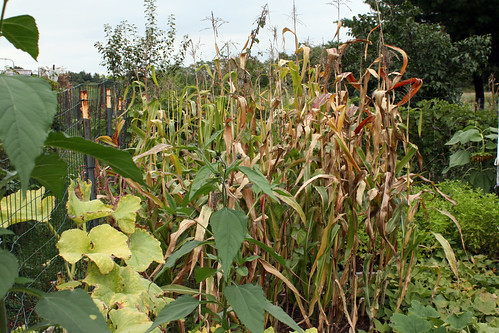I harvested most of my popcorn this week, but there were almost no kernels on the cobs and lots of worms again. I guess it had low pollination. It seemed the bed had richer soil at one end than the other – the corn grew well at one end and much slower at the other. It all matured at different times and I bet this was not good for pollination. Oh well. The worms enjoyed it anyway.
Next year, I will feed the WHOLE bed better. I’m also going to look into parasitic wasps. I asked a local organic farmer how they keep the worms away from corn and that is their trick.



8 Comments. Leave new
If it all matured at different time, it may be a problem with the variety. Is this one you grew last year? It might be better to try something else next time.
If you got it from Sandhill, you might try sending them an email and asking if variable maturation is a problem with this variety.
Last year I grew two varieties: White Hulless and Baby Golden. This year I only planted Baby Golden. The same seed package leftover from last year. The beds were different from last year's but adjacent, so they had the same sunlight exposure as last year. Since the maturation was a gradation across the beds, I have to conclude it was due to the soil conditions. I had manured well last fall, planted cover crop (rye and clover) on it, which grew to a foot tall by May. I turned it under and planted within a week. (I should have given it more time here.) When the corn was growing well there was a point where the stalks lightened and I knew I should fertilized fast, but didn't get to it for a couple weeks. Once I did, the plants where already different heights and, then later, tassels and ears formed at different times.
I do have to say, that I got away with hardly any fertilizer this year. But maybe growing corn without fertilizer is a challenge.
I have had some success with putting a few drops of mineral oil at the base of the silks when they have fully emerged, I guess the worms don't like it.
I can imagine our gardens are very different, you with your rocky New England soil and me with my wet sand. You're probably completely right in what you say.
In my garden however, my experience was very different. I hardly ever use any fertilizer, and didn't this time either. I grew both sweet and popcorn this year in different beds, something I now understand you aren't supposed to do because they can cross pollinate. Anyway, I guess they were far enough apart and pollination didn't seem to be the problem.
I grew them both on pretty depleted and weedy soil. Corn is suppose to almost always give a small yield, even on very poor soil. The popcorn bed did get a layer of compost applied to it, followed by a layer of mulch.
To be honest, I wouldn't say my harvest was great in either bed, but it was okay and about what I expected. I had about 90 plants of each type, and probably got 30 ears of sweet corn and 60 small ears of popcorn.
Both probably would have done better with fertilizer. In particular most of the popcorn plants had a second ear that never fully developed. In this case, fertilizer probably would have doubled my yield. My experience with any sort of fertilizer, even organic or manure, is you almost always get short term benefits at the expense of longer term soil health.
I didn't have corn worms, but mice did destroy a lot of my crop, especially the sweet corn.
I think the soil in both beds is now very depleted, and I probably won't be able to grow anything except beans there next year. I might even just grow a cover crop. By now both beds have had three successive years of heavy feeding crops.
I think if I grow corn on depleted soil again, I'll space the plants out a bit more.
My corn just didn't grow at all this year.
my popcorn suffered significantly from the drought (we were away and couldn't water for two weeks at its peak), and so we had very poor pollination too. and the worms had their way with it all, of course. interestingly enough, the heirloom ornamental/dwarf popcorn varieties suffered MUCH less from these problems than my hybrid types: the hybrids' ears were longer than their husks and the worms really really went to town. with this situation, the mineral oil wouldn't be a solution, i'm afraid.
what parasitic wasp was recommended to you and where are you thinking of getting it?
Maybe I can blame the drought fro some of my popcorn problems too. It was really hot and dry while I was away for 2 weeks.
I will ask about the type of parasitic wasps. I was thinking of looking into them, but from what I've heard, they will probably be too expensive for me. I'm considering asking if others at the community garden wan tot join in a purchase. I will post later if I find out the type of wasp and where to buy them.
Just wondeirng if you're planning to try popcorn again this year – I saw that you had a year of great success followed by a disappointment. I was planning to try it out here, across the river in Jamaica Plain, after being inspired by your success. Worth the space it takes up?
Thanks,
Flavia